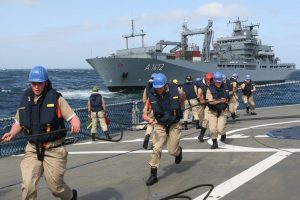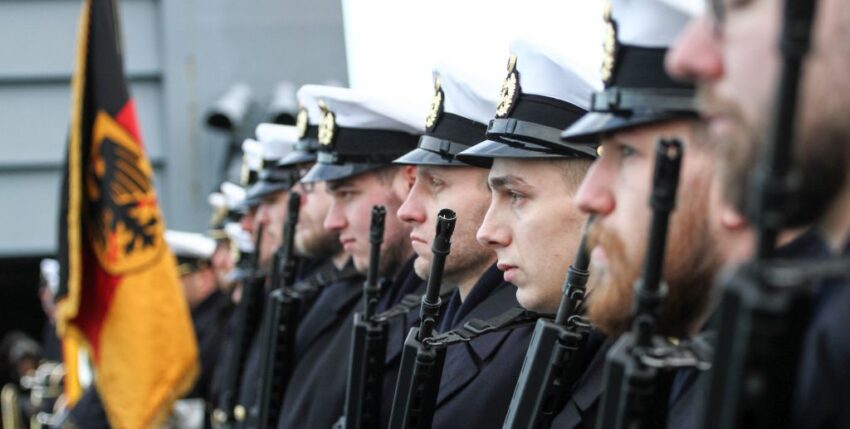
Now, after the presidential election in the USA and before the German parliamentary elections, there are more and more voices calling for a new direction for the Bundeswehr in view of recognised deficits. This has happened more than once over the past three decades. Much has been discussed about the mission and tasks of the Bundeswehr and written in the White Papers. But one question has never been put on the agenda: what is its actual political purpose?
This question is not about what the armed forces should do, but what their simple existence should achieve. What effect does Germany actually want to achieve politically by spending around €50 billion a year on the Bundeswehr?
To put it more pointedly, the question is what Germany would lose if it abolished its armed forces. A hypothetical question? For Adenauer it was very concrete, albeit in reverse. What do we gain if we re-arm ourselves, and is it worth the foreseeable high political and economic price?
Adenauer pursued three goals with the establishment of the Bundeswehr: to achieve at least partial sovereignty for the Federal Republic, to join and have a say in the NATO alliance and, as a result, to improve the general security situation. In return for the offer to establish armed forces, the Federal Republic was granted extensive sovereignty rights in the 1954 version of the Germany Treaty.
It can be said that the Bundeswehr had already fulfilled its first main purpose before the first soldier had been kitted out. Why did this work? Because the Allies trusted the Federal Republic to provide a substantial defence contribution. What exactly this would look like was not yet clear at the time and was irrelevant for the political effect.
In the next step, it was possible in 1967 to push through a change in NATO strategy that was essential for Germany, away from total nuclear annihilation on German soil and towards a flexible, initially conventional defence, the Flexible Response. This succeeded because the Bundeswehr had provided the strong conventional forces required for this type of defence, which had previously been lacking. This significantly improved the German security situation.

And finally, quite unplanned and incidentally, the Bundeswehr had already impressively demonstrated its importance for general security provision during the Hamburg storm surge in 1962. It thus fulfilled the three aforementioned purposes: sovereignty, alliance participation and security provision.
In 1955, rearmament was only possible because of the concrete Soviet threat, which everyone had been aware of since the Korean War at the latest. This threat no longer exists since 1989. If you ask an average politically interested person in Germany today whether we should not have abolished the Bundeswehr after the old East-West confrontation ended, the answer would probably still be no. The reasons could be "all countries have armed forces", "the allies expect us to" and "you never know". That sounds a bit amateurish at first, not to say naive. But it is exactly what it is all about: armed forces are an expression of sovereignty, they serve to give us a say in the alliance and to provide for unforeseen circumstances.
What does this mean for the Bundeswehr today? Security provision is more relevant than ever. Although many political surprises of the past three decades have been predicted by someone at some point, no one can say which developments will actually occur and, above all, in what order. No country in the world is in a position to make equally comprehensive security provisions for all eventualities that political augurs warn of in a never-ending series of studies. This means that we need a Bundeswehr that is prepared for a wide range of tasks without being able to completely control every eventuality. It must be robust and resistant to disruption, which in any case requires reserves and redundancies. This is first and foremost a planning and organisational issue.
In terms of influence within the alliance, we should remember the year 1954. What is important is not what Germany's forces look like in detail, but that our allies can rely on our contribution. It is less important how much we invest, but rather what we are prepared to deploy and risk. Burden sharing is being replaced by risk sharing. So the question is what Germany is prepared to do, and this is a question of political will.
With regard to our sovereignty, we must answer the question of what restrictions we are subject to. Is it possible that Germany's contribution to important missions requires the approval of Russia in China's UN Security Council, or does this decision fall under German sovereignty? This question touches on the very foundations of our understanding of security policy as we have developed it since 1990. If we do not tackle it ourselves, it will fall at our feet.
After the Bundestag election is three years before the next US election. That is not much time to clarify these fundamental questions of German security, responsibility and self-determination. Germany must have an answer, at the latest when a future American president swings back to Trump's course, so that it does not have to serve as a whipping boy again.
Text: Karsten Schneider
Featured image: Bundeswehr, Pixabay










